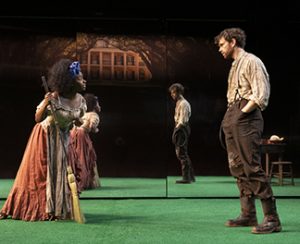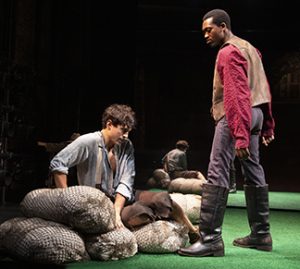By Lucy Komisar

The backdrop is a full mirror that captures the audience and, above them, a photograph of a plantation mansion. A way of subtly saying this play is also about the viewers. A piano is playing as if for a cotillion.
Kaneisha (Teyonayh Parris) a slave woman, is sweeping the floor, then rock music takes her over, she dances as if possessed. She is very erotic. Parris is a very good quixotic actor.
She addresses a white man (Paul Alexander Nolan) with a curled whip as Master Jim, but he rejects that label insists he‘s just the overseer, not “nasty McGregor” who owns the place. She suggests “Mr. Jim,” and adds, to establish the power relations, “You‘re about to beat me, you got that whip.”
He says: “I am about to beat you.” And she: “Call me a lazy Negress.” You begin to wonder about the nature of this encounter, which now appears erotic. This is enhanced by her ravenously, in a supine posture, devouring a canteloupe which he has thrown on the ground — which he insists is a watermelon.
But the scene ends with her in sexual control. Is his power and threat of violence turning her on?

Jeremy Harris‘ play is a smart, clever take on race, power, violence and sexuality, its almost cartoonish stylized performance enhance by the very inventive direction of Robert O‘Hara.
The next scene shows a four-poster bed at which a white woman (Annie McNamara) with a big hoop skirt is fanning herself. She calls out, “Phillip, your mistress needs you. I‘ve got an itch only you can scratch.”
A good-looking light-skinned black man appears. (Later she says he has cast a mulatto spell on her). He wears white pants, a black-tailed jacket, and is holding a violin. She pulls off her gown to reveal high black vinyl boots and lies seductively on the bed.
When he plays the violin, she complains she doesn‘t want Beethoven, she wants Negro music. He: “But I like Beethoven.”
She orders him to comply with her demand for sex play, which includes the use of a black dildo. It‘s pretty raunchy.
In the third, a white guy, Dustin (James Cusanti-Moyer), is piling hay bales. He rests for a bit, and suddenly a black man, Gary (Ato Blankson-Wood), berates him, “You‘re an indentured servant.”

Gary is an overseer. But he is called Nigger Gary. Dustin tells him he sounds like any other white overseer. They fight as in a dance. Dustin licks Gary‘s black boot and – a sexual finish.
Curiously, when the men in the last scene strip down to jockey shorts you see the clear brand, “Calvin Klein.” Not quite anti-bellum US. This is not like what it seems.
The stories are all about rape or sexual subservience mixed with race. And the play segues into a therapy session! Yellow folding chairs, bottles of water. It‘s “Antebellum Sexual Performance Therapy” to help black and white partners engage. Run by two women, also black and white partners.
So, a very clever satire of sexual angst complicated by race. The participants are not all crazy about what transpired.
Jim‘s comment, “I feel as if I have stepped into a madhouse. Everything about this is sickening to me.”
When Dustin says he wants to move from their East Harlem apartment not because of race issues but because it takes too long to get to auditions, therapist Patricia (Irene Sofia Lucio) responds in a put-on Spanish accent.
Te¡ (Chalia La Tour), the other therapist, explains that some are suffering from RID: racialized inability disorder, a racial sexual neurosis.
So, now you get it. It‘s very funny. I think the therapy session went on too long, but you‘ve never seen a play like this. The cast is uniformly very good. Jeremy Harris is a young playwright still in drama school. He has many clever funny works ahead of him.
“Slave Play.” Written by Jeremy O. Harris, directed by Robert O‘Hara. New York Theatre Workshop, 79 East 4th Street, New York City. 212-460-5475 Opened Dec 9, 2018, closes Jan 13, 2019. 1/10/19.

